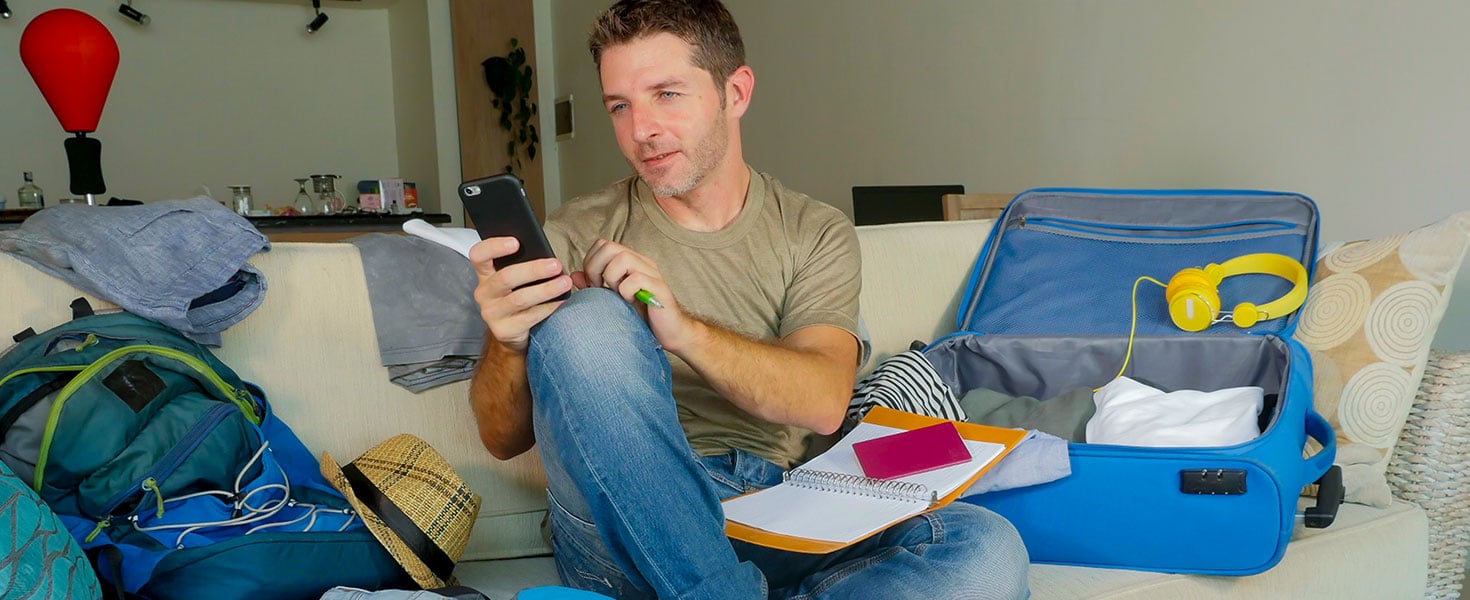As a person with ADHD, I’ve always been drawn to traveling. Blame my brain. Dopamine, the neurotransmitter released when you experience something fun or rewarding, tends to be low in ADHD folks. That’s why we crave excitement and novelty—to get extra boosts of our body’s little “feel-good” chemical.
Traveling provides plenty of novelty and excitement—yet in other ways, it can be challenging for people with ADHD. Time blindness doesn’t mesh well with flight schedules. Difficulty planning can lead to last-minute stress. Spontaneity can lead to reckless decisions. To get the best out of any trip, here are my tried and tested tips for traveling with ADHD.

ADHD travel tips before departure
Some of the most challenging aspects of travel for people with ADHD happen before we even leave home. Here’s how to plan like a pro.
Plan well in advance to avoid last-minute stress
What travel influencers never show in their videos of palm trees and tropical islands is how many mundane things need to be done before you get there—like buying insurance, arranging visas, or booking trains. People with ADHD find boring tasks particularly challenging, leading to procrastination and last-minute panic. Set reminders on your phone during the weeks or months leading up to a trip to avoid being overrun at the last minute. Leave extra time for long processes such as passport renewals.

Organize your packing
Packing is rife with distraction. You start choosing some socks, and suddenly, you’re reorganizing your entire wardrobe—while your suitcase remains empty. To stay on track, use a checklist. Either write on your own or use a list you find online, such as AAA’s essential packing checklist, to make sure you have everything you need.
Check if you can travel with ADHD medication
If you take ADHD meds, check whether they’re allowed in your destination. Some countries restrict substances like Adderall or Ritalin, so check the International Narcotics Control Board for up-to-date information on controlled substances. Carry a prescription or doctor’s note with your medication to avoid any issues at customs.
Managing ADHD while traveling
Once you set off, your goal should be to have fun while keeping yourself healthy, managing stimulation levels, and preventing burnout.

Take care of yourself
You might be tempted to ride high on the excitement of travel and forget to take care of your body along the way. When traveling, I often find myself crashing because I go from one intense experience to the next, forgetting to eat and neglecting sleep. This is common for people with ADHD; we hyperfocus on what interests us and forget our basic needs.
Eat, drink water, and stick to a sleep schedule. That’s the only way to sustain your energy for the long haul.

Plan for downtime to prevent burnout
ADHD brains love packed schedules. We want to do everything all at once. This can lead to exhaustion, so build buffer time into your plan. Take breaks between activities. Have an evening off now and then. It may feel like you’re missing out, but pacing yourself means you’ll enjoy more in the long run rather than crashing halfway through your trip.
Reduce overstimulation
Busy airports, packed itineraries, and unfamiliar environments can be overwhelming, especially for people with ADHD, who tend to be sensitive to sensory overload. If it gets to be too much, try using noise-canceling headphones, sunglasses, and fidget toys to reduce the intensity and relax.

Tips for traveling with an ADHD companion
People with ADHD make amazing travel buddies, bringing energy, enthusiasm, and a sense of adventure to any journey. These strategies can help avoid bumps in the road.
Be patient and flexible
ADHD can affect an individual’s ability to plan and manage time. Be patient with the person you’re traveling with. Accept that your trip might be more subject to change than if you were traveling alone.

Divide roles and responsibilities
Divide responsibilities according to your strengths. If your ADHD companion struggles with planning, let them take charge of researching activities and interacting with locals while you manage the schedule. This can prevent you from feeling overextended if you wind up with the lion’s share of timekeeping and planning duties.
Keep communication open
Whoever you are traveling with, it is important to talk openly about your expectations and any frustrations you may experience. Some ADHD traits, like disorganization or time blindness, might appear inconsiderate. In reality, people with ADHD often can’t help it. On the other hand, we are usually massive people-pleasers, as we have a strong fear of rejection. So, we will take it to heart if you express what you need or tell us about a particular experience you don’t want to miss out on.
ADHD doesn’t have to hold you back from exploring the world. If you follow these guidelines, travel can become one of life’s greatest joys. After all, there is no better way to escape routine, act spontaneously, and find excitement than by hitting the road.

